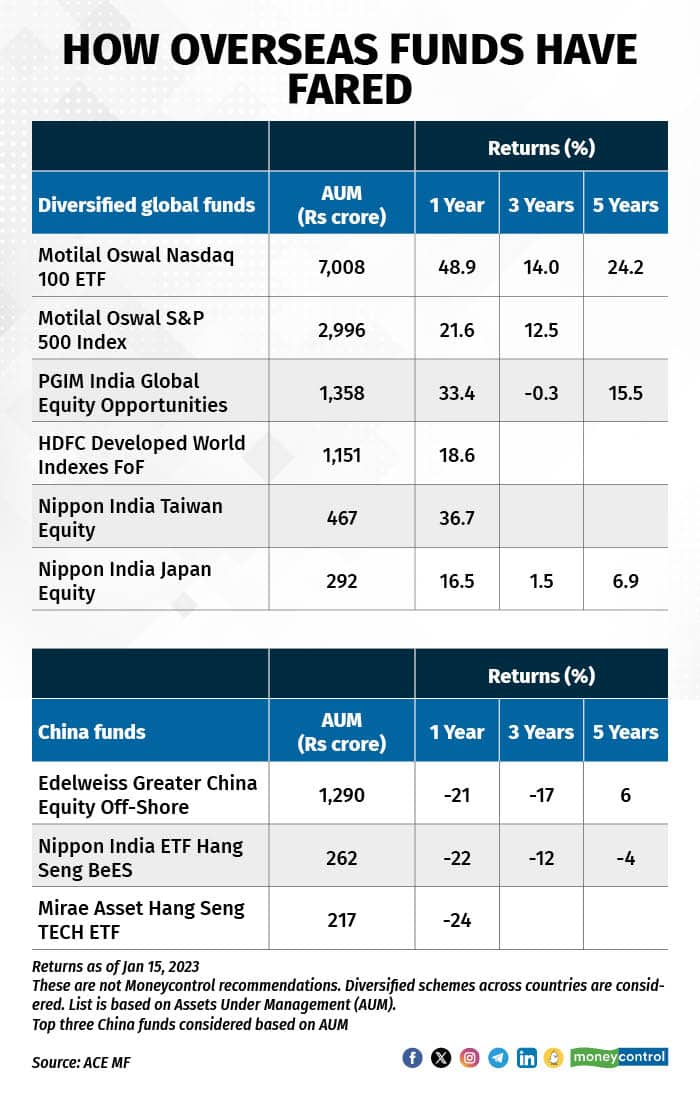



Chinese stock markets witnessing a bad spell over the past few months may not be a good value-buying opportunity yet, say experts.
As per Reuters report, China stocks slumped for a sixth straight session on February 5, with small-cap companies leading the plunge, as investor pessimism worsened on the lack of a clear signal for policy support.
Also read | Is Kenneth Andrade's Old Bridge Fund NFO a ticket to high returns or a risky ride? Moneycontrol reviews
At the start of 2023, it was widely believed that the Chinese economy, and, by virtue, global funds that invest in China, would see a rise in their values after the country scrapped its zero-COVID policy and opened its doors.
But a series of crises made headlines in China and the year ended pretty badly for it.
Tepid returns
There are five funds in India, focused exclusively on China and these schemes are down more than 30 percent, on average, in a one-year period.
The biggest in the category, Edelweiss Greater China Equity Off-Shore Fund (Rs 1,290 crore assets under management), is down 27 percent on a one-year basis.
Other China-focused funds – Nippon India ETF Hang Seng BeES, Mirae Asset Hang Seng TECH ETF, Mirae Asset Hang Seng TECH ETF FoF and Axis Greater China Equity FoF – are down up to 33 percent during the same period.
To be sure, last month, Mirae Asset Mutual Fund stopped fresh investments in some of its overseas funds, including Hang Seng TECH ETF Fund of Fund (FoF).

What ails China funds?
Since the start of 2022, headwinds, such as the property downturn, COVID-19 flare-ups, policy restrictions, and the deceleration of export growth due to global slowdown, affected the Chinese economy significantly and, in turn, the markets.
Also read | 5 investment tips for 2024, irrespective of where the market is
It was expected that the Chinese economy would bounce back from COVID, led by consumption. However, unlike other countries, revenge spending didn’t materialise in China as people’s confidence was low in the economy. Loss of jobs and savings due to the crash in the property sector has discouraged Chinese citizens from spending more. This, in turn, has resulted in consumer companies lowering their prices, which, experts say, will dent their sales and profits.
“The real-estate market, which contributes a large amount to China's GDP, is not doing quite well. That negative wealth effect has eroded the propensity to consume for a lot of consumers, which has further hit stock markets,” Niranjan Avasthi, Senior Vice President and Head-Product, Marketing and Digital, Edelweiss Mutual Fund, said.
To be sure, the fall in the real-estate market was led by a regulatory crackdown on excessive lending in the sector and a need to stop Chinese citizens from buying too much property. Another sector that has borne the brunt of the government- and perhaps over-regulation- is the technology sector. That has eroded a lot of confidence in tech companies by investors, impacting foreign fund inflows.
Outlook of China’s economy
According to a survey of economists released by the World Economic Forum (WEF) in Davos recently, the outlook for South Asia and East Asia and Pacific remains positive and broadly unchanged, compared to the last survey, with 93 percent and 86 percent respondents expecting moderate or stronger growth for South Asia and East Asia and Pacific, respectively.
“China is a notable exception as weak consumption, lower industrial production and distress in property markets weigh on the prospects of a stronger rebound in 2024,” WEF noted in the survey.
Also read | Budget 2024 and mutual funds: Industry hopes for debt taxation relief, parity with ULIPs
In the meantime, the Chinese government has provided stimulus to the real- estate space and it is working to make the domestic information technology (IT) sector more self-sufficient.
“At this point in time, we believe returns would be back-ended, because China looks attractive on the valuation front, but the signals for growth are a bit distant. So, we may see an economic recovery in the second half of this year,” said Avasthi.
What should be investors' strategy?
Ravi Kumar T V, Founder of Gaining Ground Investment Services, says, most global funds investing in China are pulling out. Some even have wound up.
“I think COVID, property sector slowdown and lack of confidence in the economy has weighed on sentiments. Global investor sentiment on China is down at this point. This is not the time to go for value buying in Chinese funds as a lot of factors are not in favour,” Kumar said.
Rushabh Desai, Founder, Rupee With Rushabh Investment Services, who had recommended investing in China funds a year to a year-and-a-half back, suggests investors to be patient.
“The Chinese economy is not going to go bust. We have been very clear that if someone wants to invest in the China market, they should have a time horizon of six-seven years and should be taken as a tactical call in the satellite portfolio. However, at this point, fresh investments should be avoided and existing investors need to be patient for at least two more years,” Desai said.
Retail investors should look at overseas investments only after putting their domestic asset allocation in order. When considering international investments, adhere to the well-established US markets whenever a favourable opportunity arises. Apart from that, investing in specific countries can be risky unless there is a comprehensive understanding of their respective economies.
Discover the latest Business News, Sensex, and Nifty updates. Obtain Personal Finance insights, tax queries, and expert opinions on Moneycontrol or download the Moneycontrol App to stay updated!
Find the best of Al News in one place, specially curated for you every weekend.
Stay on top of the latest tech trends and biggest startup news.